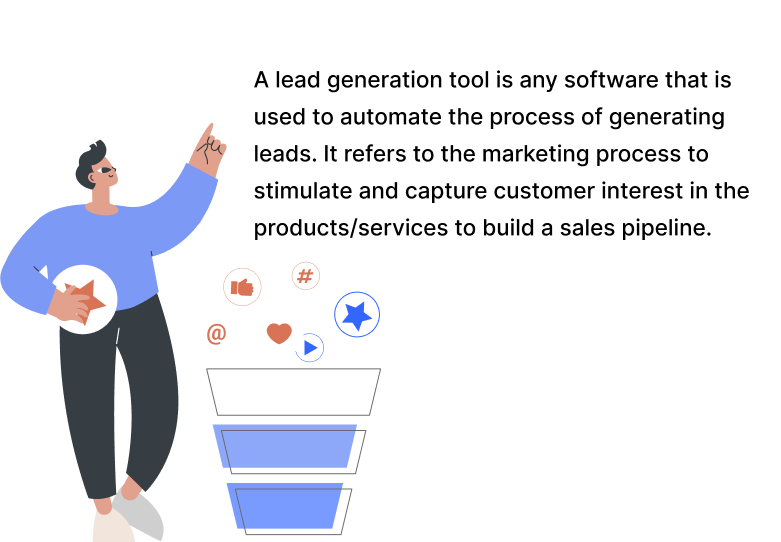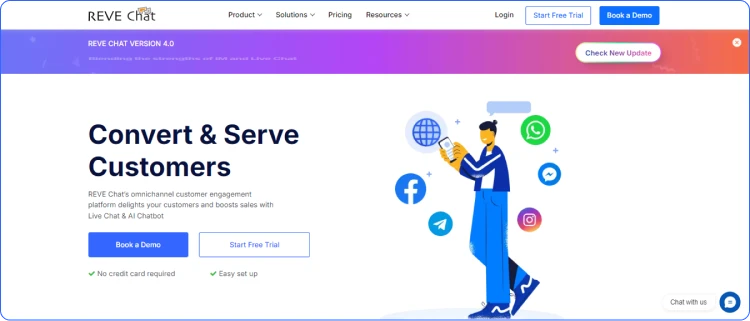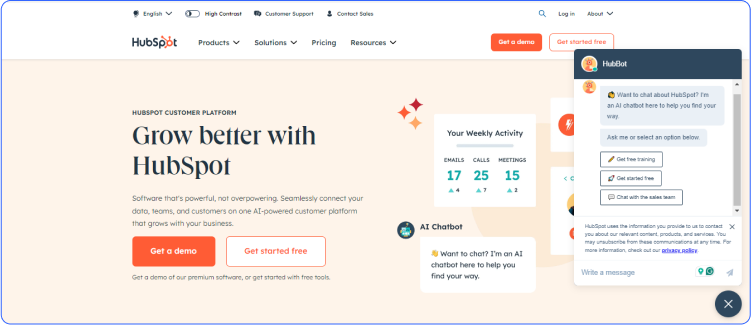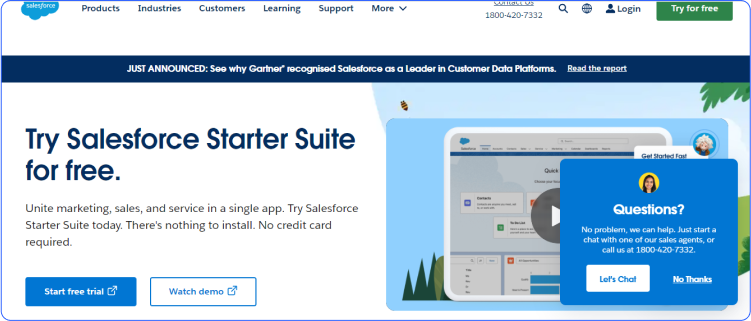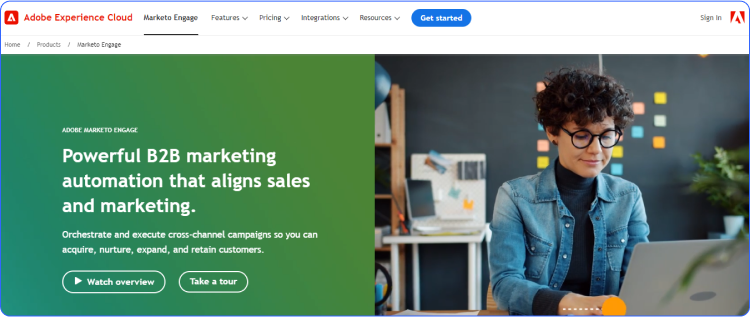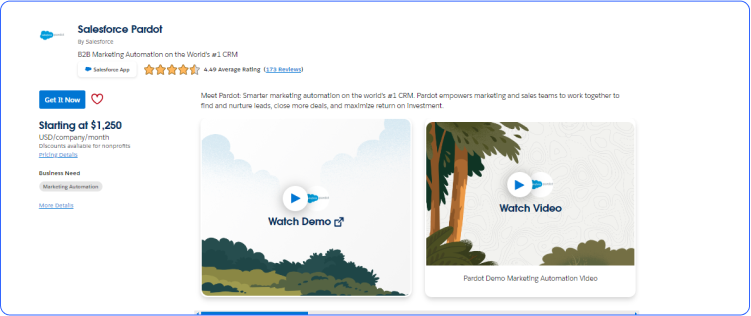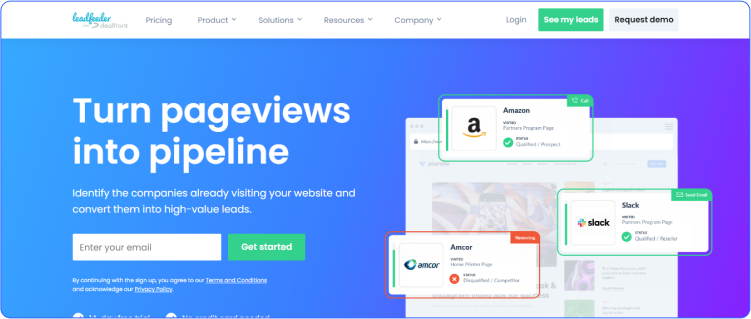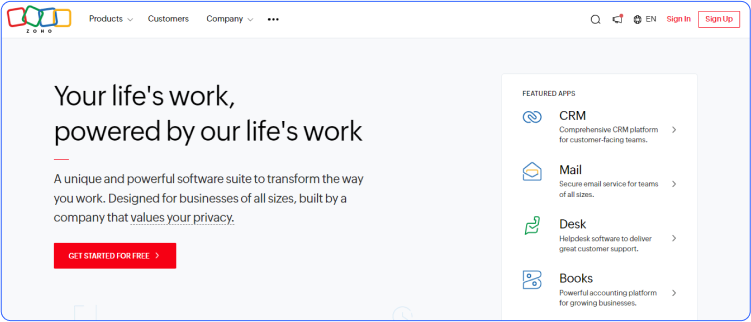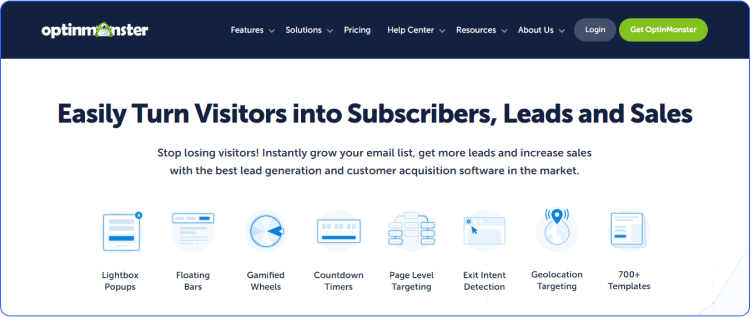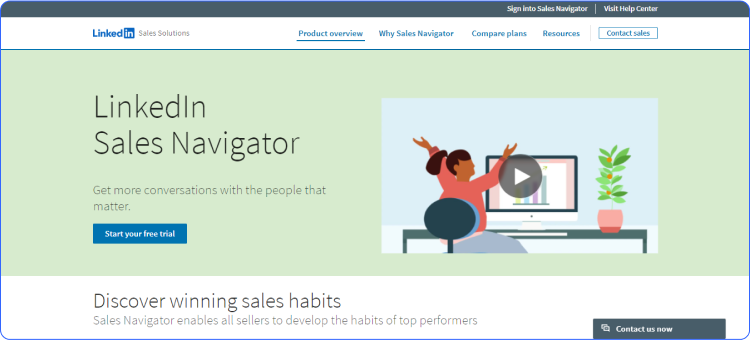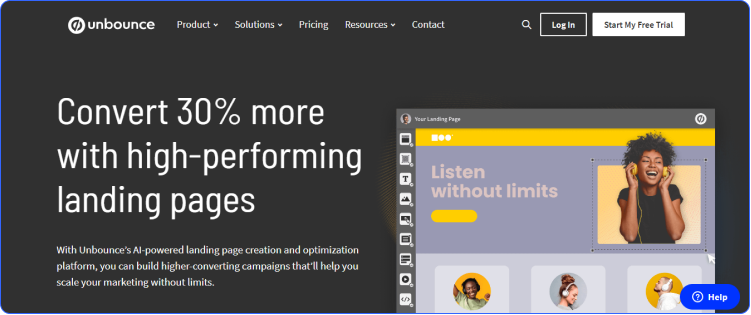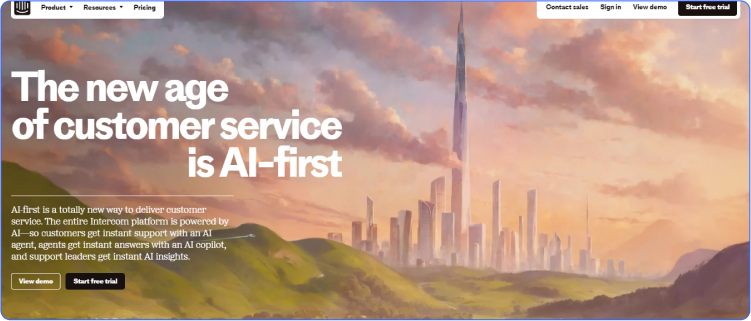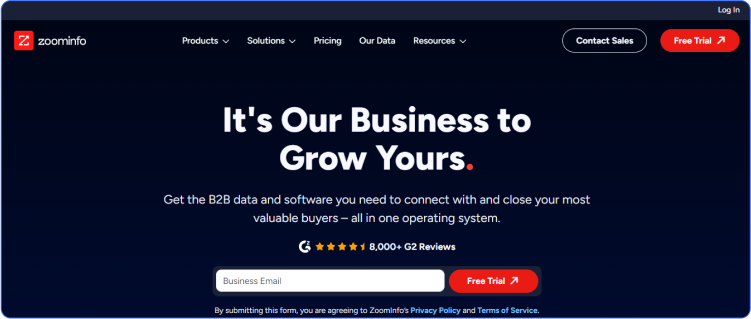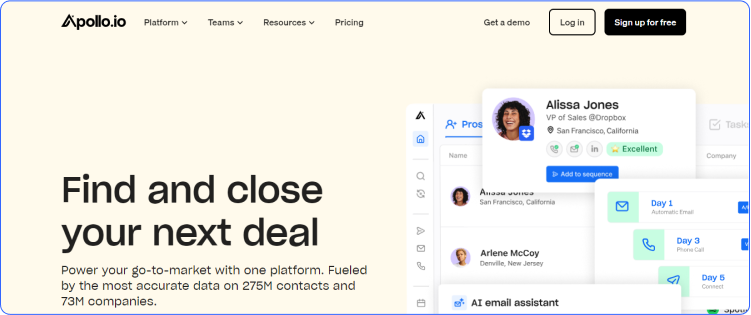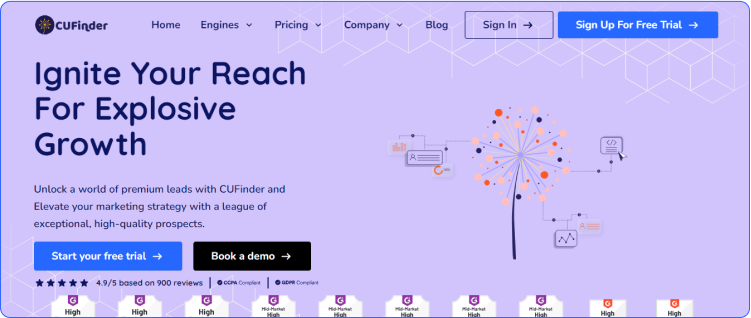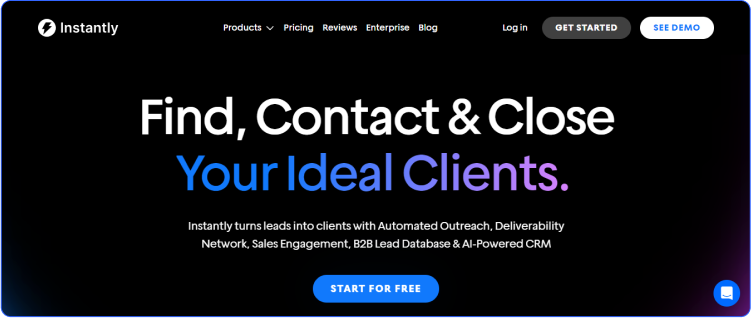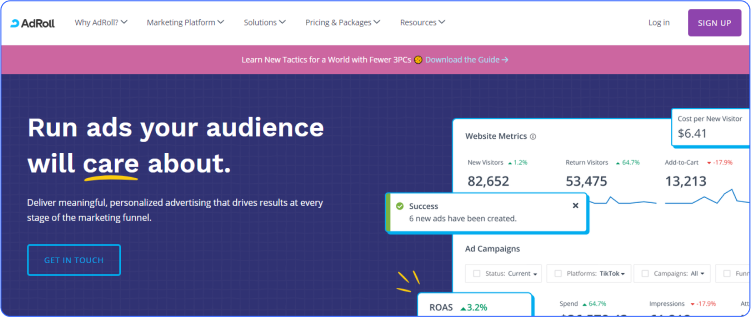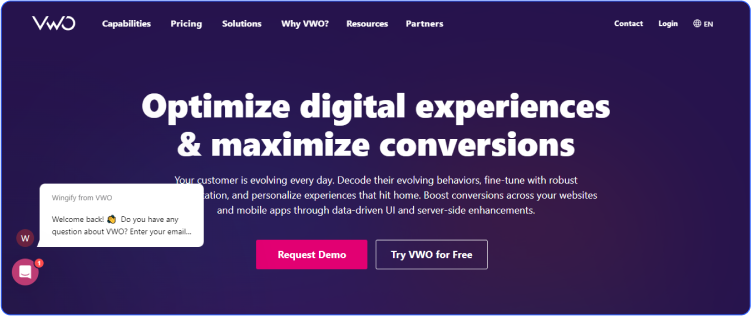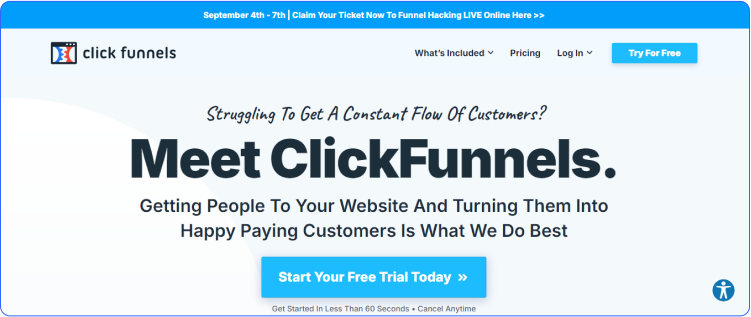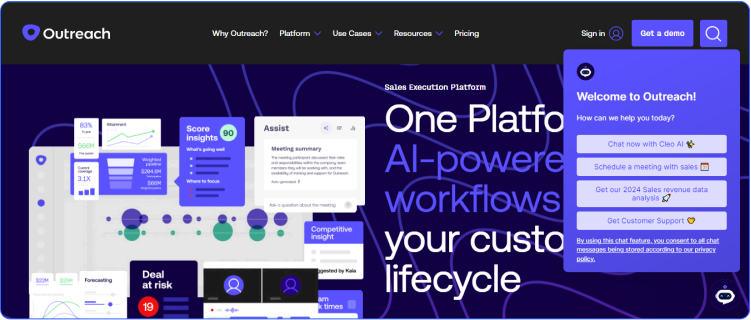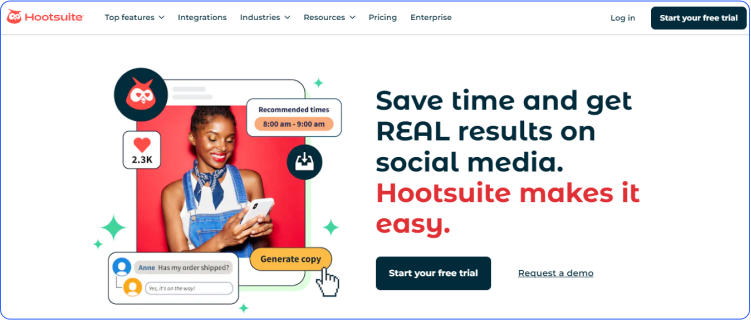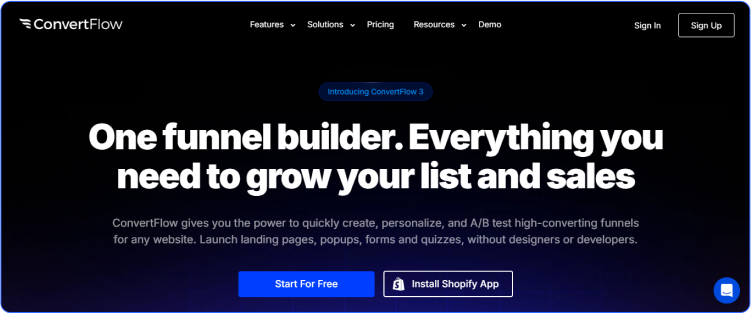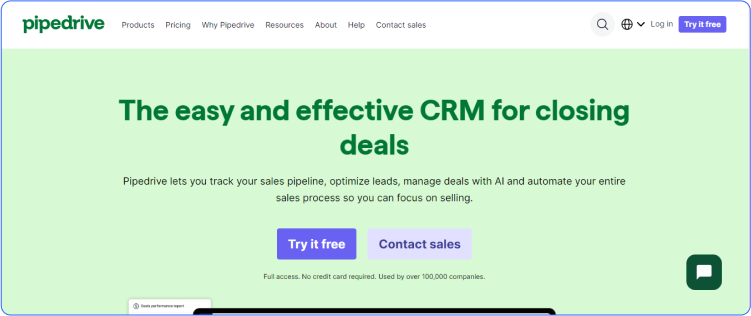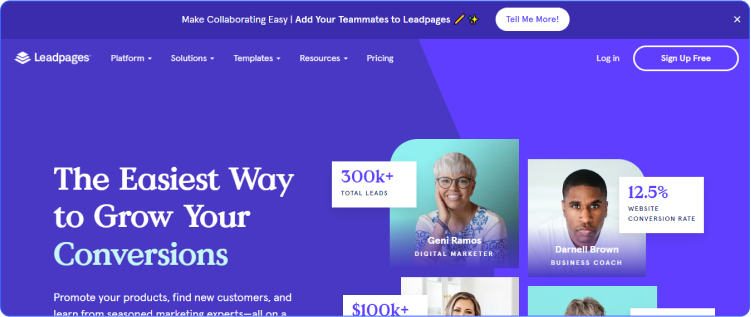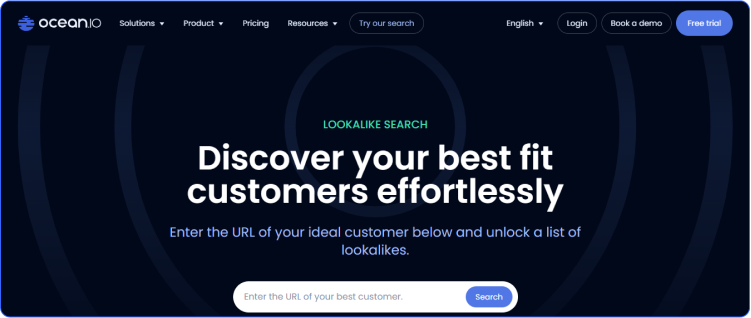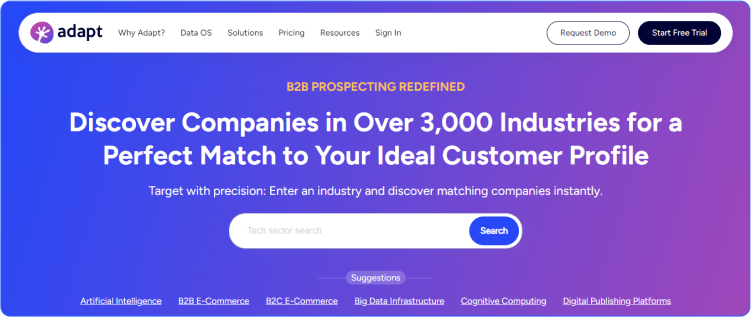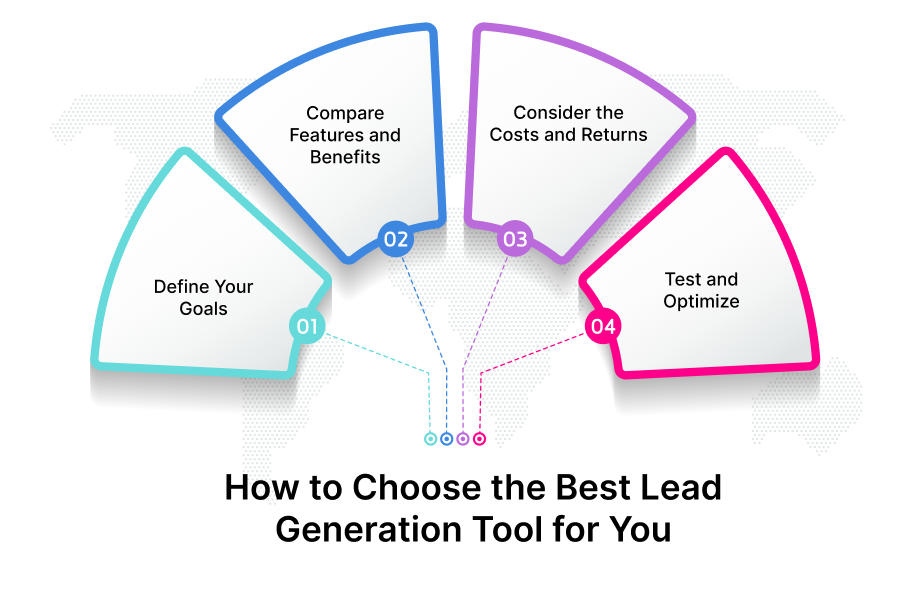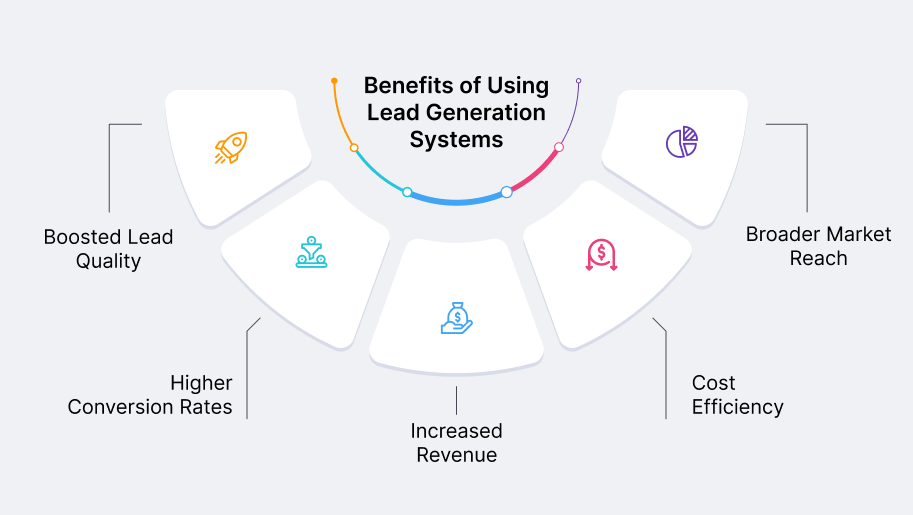25 Best Lead Generation Tools & Software (B2B & B2C) in 2025
- July 9, 2020
- 38 mins read
- Listen

Table of Content
Your marketing automation software, particularly lead generation tools, can increase your qualified leads by 451%. However, before you start allocating your marketing budget for the quarter, you need to compare and find the right lead-generation tools for your needs.
Without a good lead generation program, businesses face challenges in increasing sales conversions. HubSpot research says, 61% of marketers say generating traffic and leads is their top challenge”.
Hence, businesses need to depend on lead-generation tools as they aid in generating traffic to websites where they capture more qualified leads. Having the right lead generation platform not only drives traffic but also helps in acquiring new customers which in turn increases business revenue.
This article will review 25 lead generation tools and outline, their pros and cons so you can make an informed decision. Let’s begin!
What is Lead Generation?
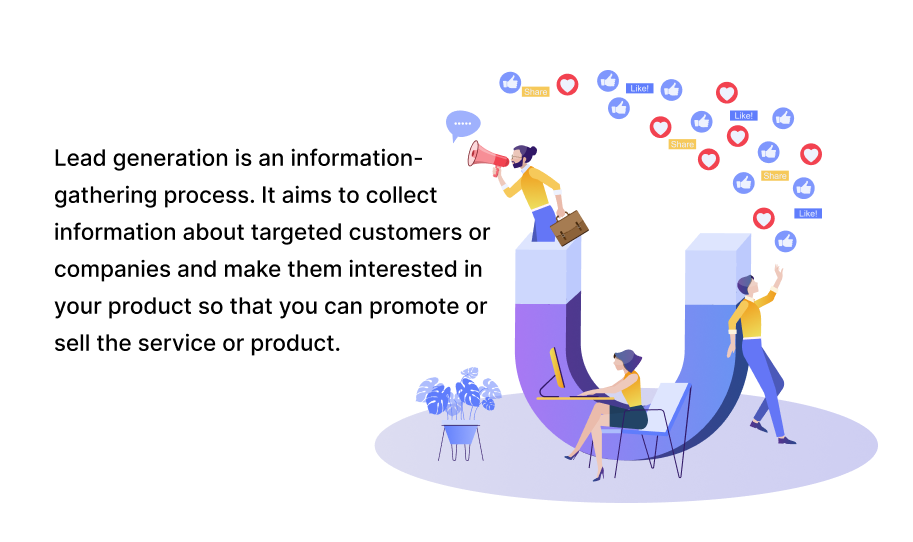
- B2B (Business to Business): B2B leads are the potential customers of companies that you have in your database. That includes contact information, such as email and phone, of the people who make the purchasing decisions within those organizations.
- B2C (Business to consumer): B2C lead generation is a strategic process that companies implement to attract and convert individuals interested in their products or services into potential customers.
What is a Lead Generation Tool?
A lead generation tool is any software that is used to automate the process of generating leads. It refers to the marketing process to stimulate and capture customer interest in the products/services to build a sales pipeline.
Popularly known as lead generators, these tools help scale the process of acquiring inbound and outbound leads. Digital channels are commonly used to capture leads, and new online lead-generation methods have changed the process significantly. With so much information available online, buyers are more informed, and new tools now help screen potential customers before they reach the sales team.
Top 25 Lead Generation Software & Tools for Your Business
Most people have this query: Which tool is best for lead generation? Best lead generation tools depend on your business needs. Tools like REVE Chat, HubSpot, and Salesforce are some of the best tools you can use for your business. We have prepared a chart below to solve your active queries. Let’s take a look.
|
Software |
Key Features |
Pricing |
Ideal Use Cases |
B2B/B2C |
|
REVE Chat |
|
Free trial available; premium starts at $15/month |
Real-time customer engagement All-in-one marketing and sales tool |
B2B & B2C |
|
HubSpot |
|
Free trial available; premium starts at $50/month |
All-in-one marketing and sales tool |
B2B & B2C |
|
Salesforce |
|
Starts at $25/user/month |
Enterprise-grade CRM and sales tool |
B2B |
|
Marketo Engage |
|
Contact for pricing |
Advanced marketing automation |
B2B |
|
Pardot |
|
Starts at $1,250/month |
B2B marketing automation |
B2B |
|
Leadfeeder |
|
Free trial; premium starts at $63/month |
Identifying website visitors |
B2B |
|
Zoho CRM |
|
Free for up to 3 users; paid plans start at $12/user/month |
SMB CRM with automation |
B2B & B2C |
|
OptinMonster |
|
Plans start at $9/month |
Capturing website leads |
B2C |
|
LinkedIn Sales Navigator |
|
Starts at $79.99/month |
LinkedIn lead generation |
B2B |
|
Unbounce |
|
Starts at $90/month |
Creating high-converting landing pages |
B2C |
|
Intercom |
|
Starts at $74/month |
Customer messaging and engagement |
B2B & B2C |
|
ZoomInfo Sales |
|
Contact for pricing |
Comprehensive B2B lead database |
B2B |
|
Apollo.io |
|
Free trial available; premium starts at $49/month |
B2B sales and outreach |
B2B |
|
CUFinder |
|
Contact for pricing |
Verifying and enriching lead data |
B2B |
|
Instantly |
|
Plans start at $37/month |
Automated cold email outreach |
B2B |
|
Adroll |
|
Free trial available; premium starts at $19/month |
Retargeting and advertising |
B2B & B2C |
|
VWO (Visual Website Optimizer) |
|
Plans start at $199/month |
Conversion rate optimization |
B2B & B2C |
|
ClickFunnels |
|
Plans start at $127/month |
Sales funnels and conversion optimization |
B2B & B2C |
|
Outreach.io |
|
Contact for pricing |
Streamlining sales outreach |
B2B |
|
Hootsuite |
|
Free trial available; premium starts at $99/month |
Social media lead generation |
B2B & B2C |
|
ConvertFlow |
|
Plans start at $29/month |
Website lead conversion |
B2B & B2C |
|
Pipedrive |
|
Plans start at $14.90/user/month |
SMBs looking for CRM with lead management |
B2B & B2C |
|
LeadPages |
|
Plans start at $49/month |
Creating high-converting landing pages |
B2C |
|
Ocean.io |
|
Contact for pricing |
Identifying and enriching B2B leads |
B2B |
|
Adapt |
|
Contact for pricing |
Building and enriching B2B contact lists |
B2B |
After exploring the comparison chart of top lead generation tools, let’s dive into a quick overview to help you pinpoint the perfect tool for your needs. Ready to make an informed decision? Let’s get started!
1. REVE Chat
REVE Chat is a comprehensive customer engagement platform. It offers real-time communication tools such as live chat, voice and video chat, co-browsing, chatbots, etc. The company focuses on enhancing customer support and driving conversions by facilitating instant interactions with website visitors.
With REVE Chat, businesses can transform their customer engagement strategy by using live chat, voice, and video chat, co-browsing, and AI-powered chatbots, ticketing to capture and nurture leads at every stage of the customer journey.
Features:
Live chat:
You can engage with website visitors in real-time to answer queries, provide information, and capture leads instantly. REVE Chat’s live chat feature allows your business to interact with potential customers at the moment of their interest, significantly improving conversion rates.
Voice & Video Chat:
You can have face-to-face personalized conversions with customers and provide faster effective solutions in the first contact. This feature is particularly effective for high-value leads that require detailed explanations or demonstrations, enhancing trust and engagement.
Co-browsing:
You can collaborate with your customers in real-time to guide them through a complex form fill-up or an application process. This feature allows you to guide prospects through complex forms, applications, or checkout processes, reducing drop-offs and increasing the likelihood of conversion.
Chatbots:
REVE Chat’s chatbots are customizable to your business needs. Its lead-generation process is always active and efficient. You can prequalify website visitors into leads by asking them a predefined sales questionnaire and directing them to the sales team for further assistance. A chatbot could boost your B2B sales strategy in a big way.
Multi-Channel Integration:
You can seamlessly integrate with various communication channels, including social media, email, and messaging apps. This ensures that your business is accessible to leads across all platforms, creating a consistent and engaging user experience.
Analytics and Reporting:
Track the performance of your lead generation efforts with comprehensive analytics. REVE Chat provides detailed insights into customer interactions, helping you refine your strategy and improve ROI.
User-Friendly Interface:
REVE Chat has a user-friendly interface that improves customer experience. You can provide a comfortable and uncomplicated journey to your customers.
Pros
- Multi-channel support.
- Easy integration with websites and mobile apps.
- Real-time customer engagement tools.
Cons
- Advanced features require premium plans.
Best For
Businesses looking for real-time customer support and engagement tools, suitable for both B2B and B2C.
2. HubSpot
HubSpot is a leading inbound marketing, sales, and service platform that helps companies attract visitors, convert leads, and close customers. Known for its powerful CRM system, HubSpot offers a range of tools that integrate seamlessly to provide a comprehensive marketing and sales solution.
Features:
CRM:
Its CRM offers a complete view of your contacts, tracking interactions across email, social media, and other channels. The CRM is designed to be intuitive and easy to use, enabling businesses to organize, track, and nurture leads without the complexities typically associated with traditional CRMs.
Email marketing:
HubSpot’s email marketing tool allows businesses to create, personalize, and optimize email campaigns that resonate with their audience. You can get detailed analytics on email performance, including open rates, click-through rates, and conversions, so you can continually refine your strategy for maximum impact.
Lead scoring:
This feature helps sales teams prioritize leads based on their likelihood to convert. This ensures that your sales pipeline remains focused and productive, reducing the time spent on unqualified prospects.
Marketing automation:
HubSpot’s automation helps you deliver the right message to the right person at the right time. This not only saves time but also enhances the customer experience by providing timely and relevant content.
Pros
- All-in-one platform with extensive free features.
- User-friendly interface and strong customer support.
- Seamless CRM integration.
Cons
- Can become expensive as you scale.
- Some advanced features are locked behind higher-tier plans.
Best For
Small to medium-sized businesses looking for an all-in-one marketing, sales, and service platform.
3. Salesforce
Salesforce is the world’s leading CRM platform, offering a wide range of tools for sales, marketing, and customer service. It is particularly well-suited for enterprise-level businesses with complex sales processes and large teams.
Features:
CRM:
Salesforce’s CRM is the foundation of its platform, providing a centralized hub for all customer-related activities. It enables businesses to manage contacts, track customer interactions, and gain a 360-degree view of their customer base.
Lead management:
These tools help businesses capture, track, and nurture leads throughout the sales funnel. With features like lead scoring, assignment rules, and automated workflows, Salesforce ensures that leads are efficiently routed to the right sales reps and followed up on promptly.
AI-driven insights:
AI-driven insights, powered by Einstein Analytics, provide advanced predictive analytics and data-driven recommendations to help sales teams make smarter decisions. Einstein leverages machine learning to analyze vast amounts of data and identify trends, opportunities, and potential risks. It can predict which leads are most likely to convert, suggest the next best actions for sales reps, and even automate routine tasks.
Extensive integrations:
One of Salesforce’s features is its ability to integrate with a wide range of third-party applications, making it a versatile platform that can be tailored to fit any business’s specific needs.
Pros
- Highly customizable and scalable.
- An extensive ecosystem with thousands of integrations.
- Robust analytics and reporting tools.
Cons
- High learning curve.
- Expensive for small businesses.
Best For
Large enterprises looking for a comprehensive, scalable CRM solution.
4. Marketo Engage
Marketo Engage, part of Adobe Experience Cloud, is a powerful marketing automation platform designed to help B2B companies drive engagement and revenue through personalized marketing campaigns. It is known for its advanced features in lead management and account-based marketing.
Features:
Marketing automation:
Its marketing automation capabilities allow businesses to streamline and scale their marketing efforts by automating repetitive tasks such as email campaigns, social media posts, and customer segmentation.
Lead nurturing:
Lead nurturing is a core strength of Marketo Engage, enabling businesses to build relationships with prospects over time through targeted, relevant content. The platform allows marketers to create sophisticated nurturing programs that guide leads through the buyer’s journey, from initial interest to final purchase.
Email marketing:
It offers a comprehensive set of email marketing tools that empower businesses to create, send, and optimize email campaigns with ease. The platform’s drag-and-drop email builder makes it simple to design visually appealing emails, while its advanced segmentation and personalization features ensure that each message is tailored to the recipient’s needs and preferences.
Account-based marketing:
Marketo Engage’s ABM tools include account scoring, personalized content recommendations, and account-level reporting, all designed to help marketers build stronger relationships with key accounts and drive more revenue from their most valuable customers.
Pros
- Advanced lead management and segmentation.
- Strong account-based marketing capabilities.
- Robust analytics and reporting.
Cons
- Expensive and complex for smaller businesses.
- Requires significant time to set up and optimize.
Best For
B2B companies focused on lead nurturing and account-based marketing.
5. Pardot
Pardot, a Salesforce product, is a marketing automation solution designed for B2B companies. It helps businesses create, deploy, and manage online marketing campaigns to boost sales revenue and optimize efficiency.
Features:
Email marketing:
Pardot’s email marketing capabilities are designed to help businesses engage with their prospects through personalized and targeted email campaigns. With an intuitive drag-and-drop email builder, marketers can easily create professional emails that resonate with their audience. Pardot also offers advanced segmentation features, enabling you to tailor your messaging based on a lead’s behavior, demographics, and stage in the sales funnel.
ROI reporting:
This platform’s ROI reporting features give businesses a clear view of how their marketing efforts contribute to overall sales revenue. By tracking the performance of individual campaigns and marketing activities, Pardot helps marketers understand which tactics are driving the most value and which areas may need adjustment.
Marketing automation:
Pardot excels in marketing automation, enabling businesses to streamline their marketing processes and scale their efforts with ease. The platform offers a wide range of automation tools, including lead nurturing workflows, triggered email responses, and automated lead assignments.
Pros
- Deep integration with Salesforce.
- Advanced lead nurturing and scoring.
- Excellent customer support.
Cons
- High cost, especially for smaller businesses.
- The user interface can be complex.
Best For
B2B companies already using Salesforce and seeking advanced marketing automation.
6. Leadfeeder
Leadfeeder is a tool that identifies companies visiting your website, providing valuable insights into potential leads. It integrates with CRM and email marketing tools to help sales teams follow up with warm leads.
Features:
Website visitor tracking:
Leadfeeder’s website visitor tracking feature is the cornerstone of its lead generation capabilities. It works by identifying the companies behind your website’s anonymous traffic, giving you a clear view of which businesses are interested in your offerings.
Lead segmentation:
Its lead segmentation feature allows businesses to categorize and prioritize leads based on various criteria, such as company size, industry, or engagement level. By segmenting leads, sales teams can tailor their outreach strategies to match the specific needs and interests of different prospects.
Analytics:
Analytics provide deep insights into your website traffic and lead-generation activities. The platform tracks key metrics such as visitor behavior, lead source, and engagement patterns, offering a comprehensive view of how potential leads interact with your website.
Pros
- Easy to set up and use.
- Integrates with popular CRMs like HubSpot and Salesforce.
- Provides actionable insights on website visitors.
Cons
- Limited to B2B use cases.
- Can become costly as website traffic increases.
Best For
B2B companies looking to identify and track website visitors for lead generation.
7. Zoho CRM
Zoho CRM is a robust CRM platform that offers a wide range of features at an affordable price. It caters to small and medium-sized businesses, providing tools for sales, marketing, and customer support.
Features:
Lead scoring:
Zoho’s lead scoring feature enables businesses to prioritize leads based on their likelihood to convert, ensuring that sales teams focus their efforts on the most promising opportunities. By assigning scores to leads based on various criteria such as demographic information, engagement levels, and interaction history, Zoho CRM helps sales reps identify high-value prospects quickly and efficiently.
Workflow automation:
This capability allows businesses to automate repetitive tasks and processes, freeing up time for sales, marketing, and support teams to focus on higher-value activities. With Zoho CRM, you can create custom workflows that trigger specific actions based on predefined conditions, such as sending follow-up emails, updating lead statuses, or assigning tasks to team members.
AI-powered sales assistant:
Zoho CRM’s AI-powered sales assistant, Zia, provides advanced insights and recommendations to help sales teams make smarter decisions. Zia can analyze large volumes of data to identify trends, predict outcomes, and suggest the next best actions for sales reps.
Pros
- Affordable pricing.
- Extensive customization options.
- Strong integration with other Zoho products.
Cons
- The user interface can be overwhelming.
- Some features are less polished compared to competitors.
Best For
Small to medium-sized businesses looking for an affordable CRM with automation capabilities.
8. OptinMonster
OptinMonster is a powerful lead-generation tool that helps businesses convert website visitors into subscribers and customers. It offers a variety of lead capture forms and exit-intent popups that can be customized and targeted to specific audiences.
Features:
Lead capture forms:
OptinMonster’s lead capture forms are designed to convert website visitors into leads by offering various types of forms, such as popups, floating bars, slide-ins, and more. These forms are fully customizable, allowing businesses to match their brand’s look and feel while delivering a compelling message or offer.
Exit-intent technology:
This technology is a standout feature that detects when a visitor is about to leave your website and triggers a targeted popup to capture their attention before they go. This feature is particularly effective in reducing bounce rates and recovering abandoning visitors by presenting them with a last-minute offer, discount, or call to action.
A/B testing:
This feature allows businesses to experiment with different versions of their lead capture forms and popups to determine which designs, messages, or offers are most effective. By testing variables such as headlines, images, and call-to-action buttons, businesses can optimize their campaigns based on real data rather than guesswork.
Page-level targeting.
Pros
- Easy to use with drag-and-drop builder.
- Highly customizable and targeted campaigns.
- Effective exit-intent technology.
Cons
- Limited to lead capture; lacks other marketing features.
- Advanced features require higher-tier plans.
Best For
B2C businesses looking to capture and convert website visitors into leads.
9. LinkedIn Sales Navigator
LinkedIn Sales Navigator is a sales management tool designed to help sales teams, particularly in B2B industries, find and connect with the right prospects on LinkedIn. It offers advanced search filters and lead recommendations.
Features:
Advanced search filters:
LinkedIn Sales Navigator offers advanced search capabilities, allowing sales teams to filter prospects based on specific criteria such as industry, job title, company size, and more. This helps in pinpointing the right leads quickly and efficiently.
Lead recommendations:
The platform provides intelligent lead recommendations based on your saved searches and interactions, helping you discover new prospects similar to your existing leads.
InMail credits:
LinkedIn Sales Navigator includes InMail credits, which allow you to send direct messages to prospects even if you’re not connected with them on LinkedIn, providing a direct line of communication to potential leads.
Sales insights:
The tool provides sales insights such as company updates, news, and lead activity, enabling you to tailor your outreach with relevant and timely information.
Pros
- Excellent for finding and engaging B2B leads.
- Integrates well with CRMs like Salesforce.
- Access to LinkedIn’s vast professional network.
Cons
- Expensive compared to other lead generation tools.
- Limited to LinkedIn’s platform.
Best For
B2B sales teams looking to leverage LinkedIn for lead generation and outreach.
10. Unbounce
Unbounce is a leading landing page builder that helps businesses create high-converting landing pages without the need for a developer. It is ideal for running A/B tests and optimizing landing pages for better conversions.
Features:
Landing Page Builder:
Unbounce’s landing page builder allows businesses to create custom landing pages without needing any coding skills. The drag-and-drop interface makes it easy to build and design pages that align with your branding and marketing goals.
Conversion Optimization:
It provides tools and features aimed at increasing the conversion rates of your landing pages, including pop-ups, sticky bars, and dynamic text replacement, all designed to enhance user engagement.
Pop-Ups:
You can create targeted pop-ups that appear based on user behavior, such as exit intent, time on page, or scroll depth, helping to capture leads before they leave your site.
Sticky Bars:
Sticky bars are non-intrusive banners that stick to the top or bottom of a page, delivering messages or calls to action without disrupting the user experience.
Pros
- User-friendly with a drag-and-drop interface.
- Highly customizable landing pages.
- Strong A/B testing and analytics features.
Cons
- Can be expensive for small businesses.
- Limited to landing pages; lacks broader marketing tools.
Best For
B2C businesses focused on creating and optimizing landing pages for conversions.
11. Intercom
Intercom is a customer messaging platform that offers a variety of tools for live chat, chatbots, email marketing, and customer support. It is designed to help businesses engage with customers in real-time and automate follow-up processes.
Features:
Live Chat:
Intercom’s live chat feature allows businesses to engage with website visitors in real-time, providing instant support, answering questions, and guiding users through the sales process.
Chatbots:
Intercom’s chatbots can handle routine queries, qualify leads, and even schedule appointments, reducing the workload on human agents while ensuring that visitors receive prompt responses.
Email Marketing:
Intercom integrates email marketing with its messaging tools, allowing you to follow up on conversations or nurture leads through targeted email campaigns.
Customer Support Tools:
Intercom includes a range of customer support tools such as help desk management, ticketing systems, and knowledge bases, all designed to improve customer service and satisfaction.
Pros
- Seamless multi-channel communication.
- Excellent for real-time customer engagement.
- Strong automation features.
Cons
- Pricing can escalate quickly with added features.
- The steeper learning curve for new users.
Best For
Businesses of all sizes are looking to enhance customer engagement through real-time messaging and automation.
12. ZoomInfo Sales
ZoomInfo is a B2B contact database and sales intelligence tool that helps companies identify, connect, and engage with their target audience. It provides detailed information on companies and contacts, helping sales teams find and reach out to leads effectively.
Features:
B2B Contact Database:
ZoomInfo Sales provides access to a comprehensive B2B contact database, offering detailed information on millions of companies and professionals. This data helps sales teams find and connect with potential leads.
Lead Enrichment:
ZoomInfo enhances your existing lead data with additional information such as contact details, job titles, and company insights, enabling more targeted and informed outreach efforts.
Account-Based Marketing:
It supports account-based marketing (ABM) strategies by allowing you to identify and prioritize high-value accounts, and tailor your marketing efforts to those specific organizations.
CRM Integration:
The platform integrates smoothly with CRM systems, ensuring that all lead and contact information is synchronized and easily accessible by your sales and marketing teams.
Pros
- Comprehensive database with accurate contact information.
- Integrates well with CRM systems.
- Provides insights for targeted outreach.
Cons
- Expensive for small businesses.
- Data accuracy can vary.
Best For
B2B sales teams looking for a comprehensive contact database to fuel their sales efforts.
13. Apollo.io
Apollo.io is a sales engagement and B2B contact database tool that helps businesses streamline their sales processes. It offers features like email automation, prospecting tools, and engagement analytics.
Features:
B2B Contact Database:
Apollo.io offers an extensive database of B2B contacts, enabling sales teams to discover and connect with key decision-makers across various industries.
Email Automation:
Its email automation tools allow businesses to set up and send personalized email campaigns at scale, helping to nurture leads and drive engagement without manual effort.
Prospecting Tools:
The platform provides advanced prospecting features, including filters and search capabilities, to help you identify and reach out to the most relevant leads for your business.
Engagement Analytics:
It offers detailed analytics on your outreach efforts, tracking metrics such as open rates, click-through rates, and response rates, so you can refine your strategies for better results.
Pros
- Comprehensive database with accurate contact information.
- Provides insights for targeted outreach.
Cons
- Expensive for small businesses.
Best For
B2B sales teams looking for a comprehensive contact database to fuel their sales efforts.
14. CUFinder
CUFinder is a B2B contact finding and data enrichment tool that helps businesses verify and update their lead information. It is particularly useful for companies that need accurate and up-to-date contact data for their sales efforts.
Features:
B2B Contact Finder:
CUFinder helps businesses locate and verify B2B contacts, providing accurate and up-to-date information such as email addresses, phone numbers, and company details to improve the quality of your outreach.
Email and Phone Number Verification:
CUFinder’s verification tools ensure that the contact details you have are correct, reducing the risk of bounced emails and improving the effectiveness of your sales campaigns.
Data Enrichment:
CUFinder enriches your existing contact data with additional insights, helping you gain a more comprehensive view of your leads and enhancing the relevance of your communications.
Pros
- Accurate data verification.
- Easy integration with CRM systems.
- Helps maintain clean and updated contact lists.
Cons
- Pricing can be high for small businesses.
- Limited features beyond data verification.
Best For
B2B companies focused on maintaining accurate and enriched contact data.
15. Instantly
Instantly is an email marketing tool designed for automated cold email outreach. It helps businesses set up and manage email campaigns, verify email addresses, and track performance to optimize their outreach efforts.
Features:
Email Marketing:
Instantly is focused on email marketing, providing tools to create, send, and manage automated email campaigns aimed at generating leads and nurturing them through the sales funnel.
Email Verification:
It includes email verification features to ensure that your email list is clean and free of invalid addresses, improving deliverability rates and reducing bounce rates.
Campaign Automation:
The platform automates the process of sending follow-up emails, scheduling campaigns, and tracking performance, allowing businesses to run effective email outreach with minimal manual intervention.
Analytics:
Instantly offers analytics tools that track key metrics such as open rates, click-through rates, and conversions, providing insights that help you optimize your email marketing strategies.
Pros
- Affordable pricing for small businesses.
- Easy-to-use email automation tools.
- Effective for cold email campaigns.
Cons
- Limited to email marketing; lacks broader marketing tools.
- Basic features in lower-tier plans.
Best For
B2B companies looking to automate and optimize their cold email outreach.
16. AdRoll
AdRoll is an advertising platform that specializes in retargeting and multi-channel marketing campaigns. It helps businesses reach their target audience across the web, social media, and email.
Features:
Retargeting Ads:
AdRoll specializes in retargeting, allowing businesses to re-engage visitors who have left their website without converting by showing them targeted ads across the web and social media.
Multi-Channel Campaigns:
It supports multi-channel marketing efforts, enabling businesses to run integrated campaigns across various platforms including web, social media, and email, ensuring consistent messaging.
AI Optimization:
It leverages AI to optimize ad placement and bidding strategies in real-time, maximizing the effectiveness of your campaigns and improving ROI.
Pros
- Effective retargeting capabilities.
- Multi-channel marketing integration.
- AI-driven campaign optimization.
Cons
- Can be complex for beginners.
- Pricing increases with campaign scale.
Best For
Businesses looking to enhance their retargeting efforts and run multi-channel marketing campaigns.
17. VWO (Visual Website Optimizer)
VWO is a conversion rate optimization platform that helps businesses improve their website’s performance through A/B testing, heatmaps, and session recordings. It is designed to help marketers understand user behavior and optimize their websites for better conversions.
Features:
A/B Testing:
VWO provides robust A/B testing tools that allow businesses to experiment with different versions of their web pages to determine which performs best in terms of conversion rates and user engagement.
Heatmaps:
Its heatmaps feature shows you where users are clicking, scrolling, and spending the most time on your website, helping you understand user behavior and identify areas for improvement.
Funnel Analysis:
Funnel analysis in VWO allows businesses to track the user journey across their website, identifying drop-off points and opportunities to optimize the conversion funnel.
Session Recordings:
VWO records individual user sessions, allowing you to see exactly how users interact with your site, and providing valuable insights into usability issues and opportunities for optimization.
Pros
- Comprehensive tools for website optimization.
- Easy-to-use interface.
- Provides detailed insights into user behavior.
Cons
- High cost for advanced features.
- Requires a significant amount of traffic to be effective.
Best For
Businesses focused on improving website performance and conversion rates.
18. ClickFunnels
ClickFunnels is a sales funnel builder that helps businesses create and optimize sales funnels to convert leads into customers. It is particularly popular among entrepreneurs and small businesses looking to streamline their sales processes.
Features:
Funnel Builder:
ClickFunnels allows businesses to create and manage sales funnels, guiding prospects through a series of steps designed to convert them into paying customers. The platform provides templates and tools to build funnels that align with your business goals.
Landing Pages:
ClickFunnels includes a landing page builder that lets you create high-converting pages as part of your sales funnel. These pages are designed to capture leads and move them further down the funnel.
A/B Testing:
ClickFunnels offers A/B testing features to help you compare different versions of your funnels and landing pages, ensuring that you are using the most effective design and messaging.
Email Marketing:
The platform includes email marketing tools that allow you to automate follow-up sequences, nurture leads, and keep prospects engaged throughout the sales funnel.
Pros
- Easy to use with drag-and-drop features.
- Comprehensive sales funnel solutions.
- Integrates well with CRM and email marketing tools.
Cons
- Can be expensive for small businesses.
- Limited to funnel creation; lacks broader marketing tools.
Best For
Small businesses and entrepreneurs focused on building and optimizing sales funnels.
19. Outreach.io
Outreach.io is a sales engagement platform that helps businesses automate and optimize their sales outreach processes. It is designed to enhance the productivity of sales teams by providing tools for email sequencing, call management, and analytics.
Features:
Sales Engagement Platform:
Outreach.io provides a comprehensive platform for managing and automating sales outreach efforts. It offers tools for sequencing emails, making calls, and tracking interactions with leads, helping sales teams stay organized and efficient.
Automated Sequences:
Outreach.io allows you to create automated email and call sequences, ensuring consistent follow-up with prospects and reducing the manual workload on sales teams.
Call Management:
The platform includes call management features, enabling sales teams to schedule, make, and track calls directly within the platform, helping to maintain a seamless workflow.
Analytics:
It offers robust analytics that tracks the performance of your outreach efforts, including open rates, response rates, and engagement metrics, allowing you to refine your strategies based on data-driven insights.
Pros
- Streamlines sales outreach and follow-up.
- Advanced automation and analytics features.
- Integrates well with CRM systems.
Cons
- High cost for small teams.
- Steep learning curve.
Best For
B2B sales teams looking to automate and optimize their outreach efforts.
20. Hootsuite
Hootsuite is a popular social media management platform that helps businesses schedule, manage, and analyze their social media content. It is ideal for businesses looking to streamline their social media marketing efforts and engage with their audience across multiple platforms.
Features:
Social Media Management:
Hootsuite provides tools to manage multiple social media accounts from a single platform, allowing businesses to schedule posts, monitor social interactions, and engage with their audience effectively.
Scheduling:
Hootsuite’s scheduling feature enables businesses to plan and automate their social media posts, ensuring consistent activity across platforms even outside of business hours.
Analytics:
Hootsuite offers detailed analytics on social media performance, tracking metrics such as engagement, follower growth, and post reach, helping businesses understand the impact of their social media efforts.
Content Curation:
Hootsuite includes content curation tools that help you find and share relevant content with your audience, keeping your social media presence active and engaging.
Pros
- Supports multiple social media platforms.
- Easy scheduling and content management.
- Strong analytics and reporting features.
Cons
- Can be expensive for large teams.
- Limited functionality in the free plan.
Best For
Businesses of all sizes looking to manage and optimize their social media presence.
21. ConvertFlow
ConvertFlow is an on-site lead conversion platform that helps businesses capture and convert leads through personalized CTAs, pop-ups, and surveys. It is designed to engage visitors at various stages of the customer journey.
Features:
On-Site Lead Conversion:
ConvertFlow provides tools to capture leads directly on your website through personalized calls-to-action (CTAs), pop-ups, and forms that engage visitors and encourage them to take the next step.
Pop-Ups:
ConvertFlow allows businesses to create targeted pop-ups that appear based on user behavior, such as time spent on a page or scroll depth, helping to capture leads before they leave your site.
Surveys:
The platform includes survey tools that enable businesses to gather feedback from visitors, understand their needs, and tailor their messaging accordingly, improving the overall user experience.
Personalized CTAs:
ConvertFlow’s personalized CTAs help businesses deliver relevant messages to different segments of their audience, increasing the likelihood of conversion by addressing specific user interests.
Pros
- Easy to set up and customize.
- Effective for capturing and converting website visitors.
- Strong integration with CRM and email marketing tools.
Cons
- Limited to on-site lead conversion; lacks broader marketing tools.
- Pricing can be high for small businesses.
Best For
B2B and B2C businesses looking to enhance their website’s lead conversion capabilities.
22. Pipedrive
Pipedrive is a sales CRM and pipeline management tool designed to help small and medium-sized businesses manage their sales processes effectively. It offers an intuitive interface and powerful automation features to help sales teams close more deals.
Features:
Sales Pipeline Management:
Pipedrive’s sales pipeline management feature allows businesses to visualize and manage their sales pipeline, ensuring that every lead is tracked and followed up on appropriately. This helps sales teams stay organized and focused on closing deals.
Lead Tracking:
Pipedrive offers robust lead tracking tools that allow businesses to monitor the progress of leads through the sales funnel, ensuring that no opportunities are missed and that follow-ups are timely.
Workflow Automation:
The platform includes workflow automation features that enable businesses to automate repetitive tasks, such as sending follow-up emails or updating lead statuses, freeing up time for more strategic activities.
Pros
- User-friendly interface.
- Affordable pricing.
- Strong automation and pipeline management features.
Cons
- Limited to sales CRM; lacks broader marketing tools.
- Customization options are limited compared to competitors.
Best For
SMBs looking for an easy-to-use CRM with strong sales pipeline management features.
23. LeadPages
LeadPages is a landing page builder that helps businesses create high-converting landing pages, pop-ups, and alert bars without any coding required. It is ideal for businesses looking to capture leads and drive conversions through targeted landing pages.
Features:
Landing Page Builder:
LeadPages provides an intuitive drag-and-drop builder that allows businesses to create high-converting landing pages without any coding knowledge. The platform offers a wide range of customizable templates to suit different marketing needs.
Pop-Ups:
It includes pop-up creation tools that enable businesses to capture leads through strategically placed pop-ups that appear based on user behavior or timing, helping to increase conversions.
Alert Bars:
The platform offers alert bars that sit at the top or bottom of a webpage, delivering important messages or calls to action without interrupting the user experience.
A/B Testing:
LeadPages’ A/B testing feature allows businesses to experiment with different versions of their landing pages, pop-ups, and alert bars to determine which designs and messaging are most effective at driving conversions.
Pros
- Easy drag-and-drop builder.
- Wide range of templates.
- Effective A/B testing features.
Cons
- Limited to landing pages; lacks broader marketing tools.
- Some templates can feel dated.
Best For
B2C businesses focused on capturing leads through landing pages and pop-ups.
24. Ocean.io
Ocean.io is a B2B data enrichment and account-based marketing platform that uses AI to help companies identify and target the right accounts. It provides detailed insights into companies and contacts to support targeted marketing and sales efforts.
Features:
B2B Data Enrichment:
Ocean.io offers data enrichment services that enhance your existing B2B contact information with additional insights such as company details, job titles, and industry classifications, helping you build more complete and accurate profiles of your leads.
Account-Based Marketing:
Ocean.io supports account-based marketing (ABM) strategies by identifying and prioritizing high-value accounts that are most likely to convert, enabling businesses to focus their marketing efforts on the right targets.
AI-Driven Insights:
The platform leverages AI to analyze vast amounts of data and provide insights into which accounts and leads are most valuable, helping businesses make data-driven decisions and optimize their marketing and sales strategies.
Lead Segmentation:
Ocean.io allows businesses to segment leads based on various criteria such as industry, company size, and engagement level, ensuring that marketing efforts are targeted and relevant to the specific needs of each segment.
Pros
- AI-driven insights for better targeting.
- Helps identify and prioritize high-value accounts.
- Integrates well with CRM systems.
Cons
- High cost for smaller businesses.
- Requires a significant learning curve to maximize benefits.
Best For
B2B companies focused on account-based marketing and lead enrichment.
25. Adapt
Adapt is a B2B contact database and sales intelligence platform that helps businesses find and connect with their target audience. It offers a comprehensive database of companies and contacts, supporting sales and marketing teams in their outreach efforts.
Features:
B2B Contact Database:
Adapt provides an extensive database of B2B contacts, offering detailed information on companies and key decision-makers across various industries. This helps sales and marketing teams identify and connect with potential leads.
Email Finder:
The platform includes an email finder tool that helps businesses locate and verify email addresses for their target contacts, improving the accuracy and effectiveness of email outreach campaigns.
Sales Intelligence:
Adapt offers sales intelligence features that provide insights into the best times to contact leads, the most effective messaging strategies, and other data-driven recommendations that enhance sales efforts.
CRM Integration:
Adapt integrates seamlessly with popular CRM systems, allowing businesses to sync contact data and streamline their sales processes, ensuring that all lead information is easily accessible and up-to-date.
Pros
- Extensive and accurate contact database.
- Affordable pricing for small to medium-sized businesses.
- Easy to integrate with CRM systems.
Cons
- Data accuracy can vary.
- Limited advanced features compared to competitors.
Best for
B2B companies looking to build and enrich their contact lists for targeted outreach.
How to Choose the Best Lead Generation Tool for You
Choosing the right lead generation tool can feel like trying to pick the perfect outfit from a crowded closet—there are so many options, and it’s easy to get overwhelmed. But don’t worry, We are here to help you sort through the clutter and find the tool that fits you just right.
Define Your Goals
First things first: what are you trying to achieve? Think about what you need from a lead generation tool. Are you focused on capturing emails, gathering detailed customer data, or driving traffic to your website? Knowing your specific goals will narrow down your choices and keep you focused on what matters most to you.
Compare Features and Benefits
Next, it’s time to get into the nitty-gritty. Every lead generation tool has its own set of features, but which ones align with your goals? Look at the tools that offer what you need—whether it’s easy integration with your existing CRM, customizable forms, or advanced analytics. Remember, a tool’s features are only valuable if they benefit your business.
Consider the Costs and Returns
Let’s talk money. It’s important to weigh the costs of these tools against the potential returns. A high-priced tool might seem tempting with all its bells and whistles, but will it really give you the ROI you need? On the flip side, a cheaper option might save you some cash upfront but could cost you lost opportunities if it lacks the right capabilities. Always think long-term when considering the cost.
Test and Optimize
Finally, don’t just choose a tool and hope for the best—test it out! Most tools offer a trial period, so take advantage of that. See how it fits into your workflow, and if it’s as user-friendly as you hoped. Gather data on how well it’s performing and be ready to tweak and optimize as you go. Your first choice might not be perfect, and that’s okay. The key is to keep refining until you find the best fit for your needs.
By following these steps, you’ll be well on your way to choosing a lead-generation tool that not only works but works for you. So go ahead, dive in, and start turning those leads into loyal customers.
Benefits of Using Lead Generation Systems
If you’re running a business and haven’t yet embraced lead generation systems, you’re missing out on a powerful tool that can take your growth to the next level. Let me walk you through why these systems are such game-changers and how they can help you attract more leads, close more deals, and ultimately, grow your business.
Boosted Lead Quality
Not all leads are created equal, and lead generation systems help you focus on the ones that matter. According to WebFX, with automated tools, you can target your ideal customer profile, resulting in a 451% increase in qualified leads. Imagine spending less time chasing dead ends and more time nurturing relationships with potential customers who are truly interested in what you offer.
Higher Conversion Rates
Quality leads naturally lead to better conversions. Companies that leverage lead generation software report that 77% of them see increased conversions (WebFX). By automating the lead generation process, you’re not just getting more leads; you’re getting more sales. This means more revenue flowing into your business with less manual effort.
Increased Revenue
Who doesn’t want to see their revenue grow? Lead generation systems don’t just improve lead quality and conversion rates—they also directly impact your bottom line. 99firms data shows that, on average, businesses that implement automated lead management see a 10% increase in revenue within just six to nine months. That’s a significant return on investment in a relatively short time.
Cost Efficiency
Let’s talk about cost. Traditional marketing can be expensive and often doesn’t yield the results you need. Lead generation systems, particularly those that leverage content marketing, can generate three times as many leads as outbound marketing at 62% less cost (99 firms). So, you’re getting more bang for your buck, which is crucial for staying competitive in today’s market.
Broader Market Reach
Finally, as more businesses recognize the value of these tools, the global lead generation market is projected to hit $295.1 billion by 2027. This growth reflects how effective these systems are at helping businesses like yours reach new audiences and expand into new markets. By adopting lead generation software, you’re not just keeping up with the competition—you’re positioning yourself to lead.
Lead generation systems help businesses from boosting lead quality and conversion rates to increasing revenue and cost efficiency, the benefits are clear. If you haven’t already, now’s the time to consider how these tools can fit into your strategy and help you achieve your business goals.
AI For Lead Generation in the Future
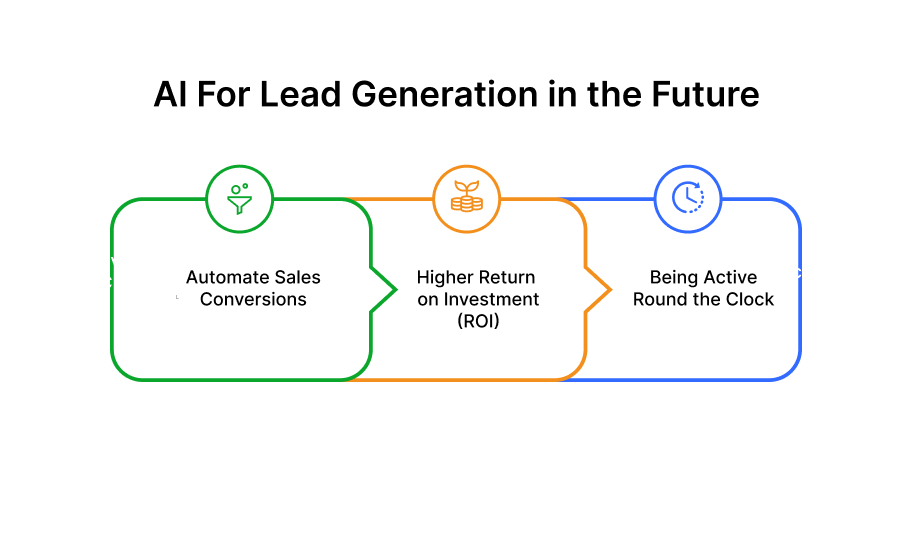
Lead qualification bots can boost operational efficiency and bring cost savings to businesses while offering higher satisfaction to customers. Deploying chatbots acts as an AI lead generation tool to ensure many advantages for your business.
Automate sales conversions:
You can automate your sales funnel with bots to prequalify leads by asking specific questions and based on their response directing them to the right team for further nurturing.
Higher return on investment (ROI):
Lead qualification chatbots to bring in business opportunities by creating effective customer experiences. They can prove a great investment to improve your overall service.
Being active round the clock:
Chatbots are always on to engage customers with instant answers to sales queries, so you can qualify leads by asking questions as per your business needs knowing the intent of the visitors, and using them for lead nurturing.
Conclusion
Having the right lead capture software for your B2B or B2C business strengthens your marketing strategy and improves capturing more qualified leads. It is important for initial prospecting, nurturing, and conversions.
Check out the above-mentioned lead generation solutions to streamline your sales and marketing processes, optimize your online lead generation efforts, and close more deals successfully. Start transforming your lead generation strategy today. Book a demo now.
Frequently Asked Questions
B2B (Business-to-Business) lead generation focuses on attracting and nurturing leads for businesses that sell products or services to other businesses. It often involves targeted marketing efforts such as industry-specific content, LinkedIn outreach, and account-based marketing strategies.
Lead generation process is the method to identify and attract potential customers. Let’s take a look at the 4 steps of the lead-generation process:
1. Attract: Use various strategies to draw potential leads to your business, such as content marketing, social media, SEO, and advertising.
2. Capture: Collect contact information from prospects through forms, landing pages, and calls to action.
3. Nurture: Build relationships with leads through personalized communication and content, guiding them through the sales funnel.
4. Convert: Turn nurtured leads into customers through targeted offers, follow-ups, and effective sales strategies.
You can follow the below options to do online lead generation.
1. Optimize Your Website
2. Leverage Social Media
3. Create Valuable Content
4. Use Paid Advertising
5. Implement Email Marketing
Web lead generation involves using online channels to attract and capture leads. This includes optimizing your website for lead capture, using online forms, engaging in SEO, and leveraging digital marketing strategies to drive traffic and convert visitors into leads.
Lead generation software serves both marketing and sales functions. It helps marketing teams attract and capture leads, while sales teams use it to manage and nurture these leads through the sales funnel. The software provides tools for automation, tracking, and analytics that support both departments.
Paid lead generation software generally offers more advanced features, greater customization, and better support compared to free options. However, free tools can be a good starting point for smaller businesses or those with limited budgets. The choice depends on your specific needs and resources.
The features of lead generation software are shared below-
1. Lead Capture Forms
2. CRM Integration
3. Email Marketing
4. Analytics and Reporting
5. Lead Scoring
6. Automation
7. A/B Testing

